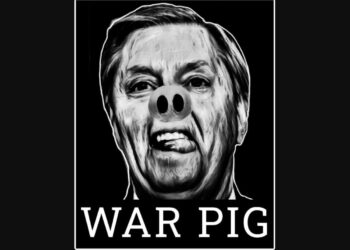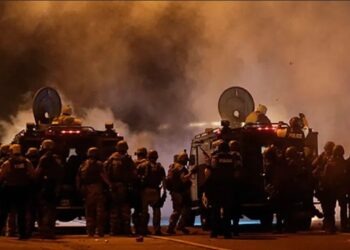The Russo-Ukrainian war is not yet resolved, but it already has a clear winner, the People’s Republic of China (PRC). The PRC provides great assistance to Russia—diplomatic, economic, and "dual use” military aid—all of which is important to sustain Russia’s war. In turn, Beijing is receiving a prodigious return.
First, by sustaining the war, the PRC occupies the U.S. and so diverts attention from its aggressive acts and preparations for war over Taiwan, which might include attacks against the U.S. itself. The U.S. intelligence community and military only have so much bandwidth, and the wars in Ukraine, Gaza, and elsewhere in the Middle East are filling it. In addition, U.S. stockpiles are drained, including in 155mm artillery rounds, reducing the ability the U.S. military to fight a high-intensity war with the PRC. In turn, a reduced U.S. arsenal hurts the conventional deterrent of the U.S. in key theaters, like the western Pacific and Taiwan.
Second, the war cements Putin’s dependence on the PRC. Putin is now Xi’s myrmidon and is the supplicant in the relationship. Putin has been drafted by Xi to serve in his anti-Western alliance which costs Putin his autonomy. Xi is anti-Western because he seeks to overthrow U.S. power and position in the world and shackle the world to the PRC’s tyrannical ambitions. Putin’s interest would have been better served by emerging as the tertius gaudens of the conflict between them. Now that he has tied Russia’s interests to China, he will walk the path Xi requires of him. This will require Russia to accept diminished influence where Russia’s interest conflict with the PRC, such as in Central Asia, and to serve as an instrument of distraction for the U.S. and its NATO allies while China expands its military power and strategic ambitions. Once Putin has served his usefulness, Xi will overthrow him.
Third, Putin also serves as a lightning rod, attracting the world’s animus and attention for his acts while Xi’s genocide in Xinjiang remains too often unremarked and in the background. An afterthought of the world’s conscience. The PRC’s preparations for war against Taiwan and increasingly coercive measures against the Philippines and Taiwan also do not receive the attention they deserve.
Fourth, as a result of the war, Xi has secured his northern flank. Russian conventional and nuclear military power is now a tool to be employed in conjunction or apart from the PRC’s military but to serve Beijing’s interests. The U.S. has a "multiple front” war problem with which it must contend. Moreover, Xi has secured his western flank in Central Asia. The Central Asian states perceive Russia as a threat due to the invasion of Ukraine and see Moscow as the junior partner in the Sino-Russian relationship. For Xi, this is a remarkable occurrence at the same time that China is waging genocide against Kazakh, Kyrgyz, and Uighur Muslims in Xinjiang or East Turkistan. The PRC’s western flank is as secure as it has been in recent years.
With two flanks secure and the expansion of Xi’s ability to project power, the U.S. and its allies should expect China to center its aggression on its southern and eastern flanks.
Fifth, Russia is likely sharing intelligence on the performance of U.S. and other NATO weapon systems and on the military effectiveness of the Ukrainian military, which is increasingly receiving U.S. and other NATO military training. It is suspect that Serbia shared intelligence with the PRC from the downed U.S. Air Force F-117 in 1999 and that Pakistan did with respect to the stealth helicopter lost in the 2011 raid against Osama bin Laden’s hideout in Abbottabad. The PRC shared intelligence with Russia from the EP-3E that executed an emergency landing in Hainan in 2001. So there is a pattern of intelligence sharing by U.S. foes. That shared intelligence will aid the military effectiveness of the PRC and aid its development of countermeasures to U.S. capabilities when the PRC aggresses—which may be far sooner than anticipated.
Sixth, there is concern about intelligence leaks from Ukraine. Ukraine has a history of economic cooperation with the PRC. In 2019, the PRC became Ukraine’s largest trading partner, and Huawei had a major presence building the country’s IT systems. Ukrainian firms have sold nuclear reactor parts, aircraft wing and engine as well as missile engine technologies, ballistic and cruise missile technology, and selling the aircraft carrier Varyah (Varyag in Russian) to the PRC, which now serves as the Liaoning in the PRC’s navy.
Given long-standing cooperation, and Huawei’s presence, the PRC very well could have intelligence networks in Ukraine to collect on political, economic, and military intelligence, including the performance of U.S. and other NATO weapons used by the Ukrainians and on the performance of Russian systems and the Russian military. The U.S., NATO, and other countries have taken the risk that technology, including Patriot missiles and ATACMS, sent to Ukraine will be shared with the PRC. Moreover, as the U.S. is almost certainly sharing targeting and other intelligence with Ukraine, the Ukrainians have a better sense of U.S. capabilities, all of which may be shared with Beijing or that the PRC may collect as a result of its own capabilities.
The bottom line is that the Russo-Ukrainian war greatly benefits the PRC. As the PRC gains intelligence about U.S. and other NATO capabilities, this hurts the U.S.’s ability to defend its national security interests elsewhere, including in the western Pacific. In turn, this weakens the ability of the U.S. to deter aggression against Taiwan, the Philippines, and other states, as well as the ability to fight a war with the PRC, should deterrence fail.
The costs of the Russo-Ukrainian war are high in every respect. While Moscow may eke out a Pyrrhic victory, the true winner of the war is Beijing. The true loser may be the U.S. if its weakened deterrent invites a PRC attack against Taiwan and even the U.S. itself.
Bradley A. Thayer is a Contributing Columnist for Warroom and is @bradleythayer on Gettr and Truth, and @bradthayer at X. He is the coauthor with James E. Fanell of Embracing Communist China: America’s Greatest Strategic Failure.





